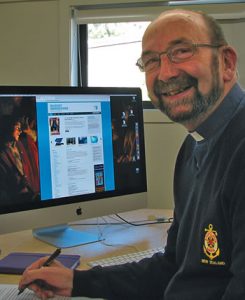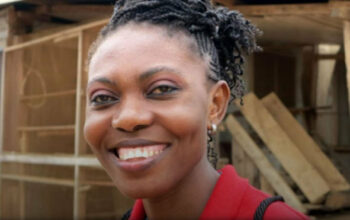Day of Prayer Against Human Trafficking – 8 Feb

Fr Kevin Head SM
Trafficking occurs for many reasons – for work in sweatshops, illegal adoption of children, organ transplants, forced marriages, drug trafficking, begging and prostitution among others.
When she was twenty-six, Blessing Okoedion went to Spain from Nigeria with a promise of work in a computer business. However, when she reached Spain, there was no job for her, she had a forged visa, and her traffickers said she owed them $70,000. She had no way to pay, so they sent her to Naples and forced her to work on the streets as a prostitute.
Blessing found her way to a shelter, the ‘Casa Ruth’ centre in Naples, part of Talitha Kum, a network of more than two thousand religious sisters in ninety-two countries dedicated to fighting modern-day slavery. 'Casa Ruth' was founded by Ursuline Sister Rita Giaretta and is run by Italian nuns for victims of trafficking. Blessing now advocates for and assists other victims of trafficking.
While many would like to pretend modern slavery happens elsewhere, it does occur in New Zealand and usually involves exploited migrants.
Christina Stringer is an associate professor in the Centre for Research on Modern Slavery at the University of Auckland Business School. She says that “on any given day, as many as 3000 migrants may be being exploited in New Zealand.”
Professor Stringer also spoke of a woman living in a Christchurch house owned by her employer. She shares a room with a colleague, sleeps on a mattress on the floor and cooks on a small gas cooker. There are six bedrooms with a shared bathroom and garden. She pays $210 per week in rent, taken from her wages. On her day off, her employer sometimes asks her to perform other tasks. If she refuses, there is a penalty – another deduction from her weekly pay.
Christina Stringer says that she has “talked to migrants who have been paid what they are legitimately owed, but then they are required to pay money to their employer. The employer fulfils the legal requirement, but then the employee has to pay the cash back to the employer."
Crimes against migrant employees often remain hidden. This is because such workers are afraid that they will be deported if they speak to the authorities about their dreadful work situation. In fact, such is not the case.
Professor Stringer states that exploitation takes many forms. They mainly involve low pay rates, long hours of work, no holiday pay and forcing employees to work even though they are ill. One person Professor Stringer spoke to received $3 an hour. Another interviewee often worked 70 hours and sometimes 90 hours a week for $8 an hour.
St Josephine Bakhita was born in about 1869 in Olgossa, Darfur, Sudan. She died on 8 February 1947 in Schio, Veneto, Italy. Beatified in 1992 and canonised on 1 October 2002, St Josephine is also known as ‘Mother Moretta’ -- ‘our Black Mother.’ She had almost one hundred and fifty physical scars on her body, received after being kidnapped at the age of nine and sold into slavery. Her feast day, 8 February, is the Day of Prayer Against Human Trafficking.
St Josephine Bakhita, pray for us
See the prayer on page 21
If you are concerned that a person may be a victim of exploitation or trafficking:
In New Zealand
• To report a case of migrant exploitation, contact the MBIE Service Centre:
0800 20 90 20 or the dedicated number 0800 20 00 88. This number operates Monday to Friday, 8 am-5.30 pm, excluding public holidays, to enable the reporting of exploitation in the workplace. Interpreters in more than 180 languages are available.
• To report people trafficking, call the local police, or 105 or, if it is an emergency,
dial 111
• To report an issue anonymously call Crimestoppers on 0800 555 111 or by way of an online Crimestoppers form, www.crimestoppers-nz.org
In Australia
Contact the Federal Police: phone 131AFP (131237), or email
AOCC-Client-Liaison@afp.gov.au

Blessing Okoedion
References:
“I just want to feel safe”: Modern Slavery in New Zealand, Vicki Anderson, Stuff, 2 October 2021
A plywood box in a liquor store backroom, home for one of New Zealand's estimated 3000 modern day slaves, Been Bathgate, Stuff, 6 November 2021
Today’s Biden/Pope summit seen through the eyes of a trafficking victim, John L Allen, Crux 29 October 2021
 Entries(RSS)
Entries(RSS)